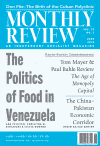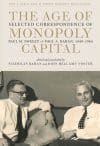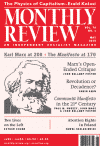Americas

In his insightful new book, the historian David Roediger raises critical questions for scholar-activists seeking to understand white racism and contemporary capitalism and its class realities. He joins a long line of thinkers who have clearly recognized the need for both specifically racial and more universal, class-oriented programs of major social and economic change. | more…

This special issue is dedicated to developing the ecological critique embodied in Marx’s theory of “metabolic rift.” Each article uses the metabolic rift perspective to uncover core contradictions of capitalism, as well as possible paths toward a new system—one that will meet human needs while protecting the earth and future generations. | more…

Ecological Disasters and the Lessons of History
When scientists describe the increase of Dust Bowl-like conditions under climate change, they signal a particular kind of violent ecological and social change. But equally violent are the social forces, historical developments, policies, and practices that produce such massive socioecological crises in the first place. | more…

Millions of Americans face increasing difficulty finding well paying, secure jobs. But the current employment crisis is not so much due to the educational system as it is to a sustained corporate effort to keep the public in ignorance about the damage wrought by the global economy itself. Miseducating for the Global Economy reveals that behind the going concern for “global economy education” lies capitalism’s metastasizing indifference to human values, to a fair distribution of resources, to its radical restructuring of workplaces with an attendant intensification of work effort, and to the genuine well-being of workers and their families. | more…

With the eruption in March of the scandal around Cambridge Analytica and Facebook, articles raising the alarm on “surveillance capitalism” are suddenly everywhere. The term, which was coined in MR in August of 2014, was developed to highlight the links between digital spying systems and contemporary capitalism as a whole. Academic interpretations of the concept effectively divorced surveillance capitalism from class analysis, and from the overall political-economic structure of capitalism—as if surveillance could be abstracted from monopoly-finance capital as a whole. | more…

Few countries and political processes have been subject to such scrutiny, yet so generally misunderstood, as Venezuela and the Bolivarian Revolution. This is particularly true today, as the international media paints an image of absolute devastation in the country, wrought by failed policies and government mismanagement. One way to comprehend the complexities of what is happening in Venezuela today—missed entirely by the dominant, mainstream narrative—is by homing in on the dynamics around Venezuela’s most highly consumed staple foods. | more…

During the 1960s, Cuban medicine experienced changes as tumultuous as the civil rights and antiwar protests in the United States. While activists, workers, and students in western Europe and the United States confronted existing institutions of capitalism and imperialism, Cuba faced the even greater challenge of building a new society. | more…

Paul A. Baran (1910–1964) and Paul M. Sweezy (1910–2004) were two of the most creative and influential Marxist economists of the last century. The Age of Monopoly Capital collects hundreds of letters between Baran and Sweezy, written between 1949 and Baran’s death in 1964. The correspondence contains numerous interesting, important, and unanticipated ideas. Nuggets of wisdom about economic theory, socialist history, dialectical method, academic politics, and many other topics are scattered throughout. | more…

Instead of theory, early U.S. radicals excelled in reportage, like John Reed’s Ten Days That Shook the World, or fiction, like Upton Sinclair’s packing-house shocker The Jungle. To Europeans American thought seemed impermeable to the difficult ideas of Marxism. That changed with the founding of Monthly Review in 1949, which marked a newly realized if not entirely new trend in American Marxist thought. | more…

Karl Marx famously wrote in The Eighteenth Brumaire of Louis Napoleon that history repeats itself, “first as tragedy, then as farce.” The Cold War, waged between the United States and Soviet Union from 1945 until the latter's dissolution in 1991, was a great tragedy, resulting in millions of civilian deaths in proxy wars, and a destructive arms race that diverted money from social spending and nearly led to nuclear annihilation. The New Cold War between the United States and Russia is playing out as farce—a dangerous one at that. The Russians Are Coming, Again is a red flag to restore our historical consciousness about U.S.-Russian relations, and how denying this consciousness is leading to a repetition of past follies. | more…

The neoliberal restructuring of U.S. higher education is widely recognized, but nonetheless treated superficially and piecemeal in most left analyses, with little critical understanding of its inner political-economic logic. It is here that American observers have the most to learn from their British counterparts. | more…

Jane Lazare has written a fascinating, intensely personal book about history, family, and the Communist Party in the United States. She knows this story well: her father was an active Communist organizer, and the memoir recounts his life and hers, and the connections between them. | more…











